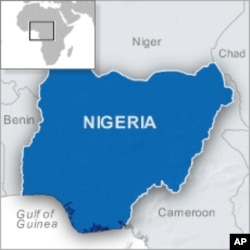Violent, rigged elections have been the norm in Nigeria since 1999 when the country moved from military to civilian rule.
Election-related violence killed at least 300 people during the last nationwide poll in 2007, which was so marked by voter intimidation and ballot stuffing that it was rejected by many national and international observers.
Now, just weeks away from a series of nationwide elections that promise to be the country's most contested to date, Human Rights Watch says election-related violence has killed more than 50 people since November and is expected to increase.
The head of Nigeria's federal law-enforcement agency, the State Security Service, warned politicians at a meeting this week in the capital, Abuja, not to use violence against their rivals.
Chairman of the Election Working Group at the Nigerian Bar Association, Dafe Akpedeye, said these warnings need to be paired with increased accountability.
"If people have done violence in the past and nothing has happened to them, then there is the motive to do more violence," said Akpedeye. "Everyone is craving that political power because with political power comes all the perks associated with it. Because people want this desperately, they'll do anything they can to ensure that nobody gets them out of office, win the elections by any means, whether fair or otherwise."
He said bombing a political rally can be a way to block rival candidates from campaigning or intimidate an opponent's supporters in the hopes that they won't go to the polls on election day.
Nigerian authorities have expressed concern about bombings and other forms of pre-vote violence.
The most recent attack happened two weeks ago when a bomb exploded in a roadside market near a ruling party election rally in the central town of Suleja, killing 10 people and injuring at least 20 more.
Car bombings rocked the capital, Abuja, on Independence Day in October and on New Year's Eve, killing dozens. On Christmas Eve, explosions and reprisal attacks rocked the country's volatile middle belt region, where religious and ethnic clashes have killed hundreds in recent years.
Opposition campaigns in the country's troubled oil-producing Niger Delta region have also been the targets of bombings. The main militant group in the Delta, MEND, said this week it would launch fresh attacks on oil installations and political meetings.
Human Rights Watch says corrupt politicians, in many cases backed by mafia-like "godfathers," openly mobilize gangs of thugs to terrorize ordinary citizens and political opponents and to stuff or steal ballot boxes. Akpedeye says the police charged with investigating these crimes often turn a blind eye, or sometimes participate, in abuses.
"Because the police themselves have stood by while this violence happened, they are more or less implicated in the process. If you ask me, they are complicit in the process, so they can be judged on their own costs," Akpedeye said.
The Nigerian Bar Association and Human Rights Watch are calling on the National Assembly to pass a now two-year-old bill that would create a special Electoral Offenses Commission to investigate and prosecute election-related abuses, including violence.
"If you warn me and I know that there are no consequences for my bad behavior, why should I stop?" Akpedeye asked. "If you have an independent commission, then the powers that be can actually be brought to book and punished."
Nigeria goes to the polls for nationwide elections next month, including a presidential poll on April 9.




